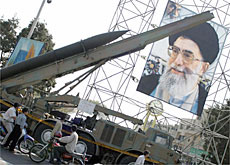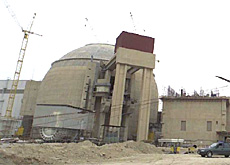Swiss deny being soft on nuclear exports

The government has denied that lax controls allowed Swiss firms to illegally export material for use in the nuclear programmes of Iran and Libya.
Two companies and 15 individuals are under investigation by the Swiss authorities for their alleged role in the trade.
The International Atomic Energy Agency (IAEA) recently handed over a list naming Swiss-based firms and individuals who allegedly supplied parts to Iran and Libya for their nuclear programmes.
The names came to light following recent visits to both countries by the IAEA, which has resumed inspections in Iran and Libya.
One of the individuals on the list, St Gallen-based engineer Friedrich Tinner, has come under IAEA scrutiny on two previous occasions.
The Swiss reportedly investigated Tinner in 1996 for trying to ship material to Iraq for possible use in uranium enrichment centrifuges – a vital element in the production of weapons-grade material.
“We investigated companies run by Mr Tinner in the past and our conclusions were that they did not violate Swiss export laws,” Othmar Wyss, head of export controls at the State Secretariat for Economic Affairs (Seco), told swissinfo.
Export controls
Wyss denied that Swiss export controls made it easier for some materials to slip through, arguing that regulations were comparable with those found in other countries.
He said exports of controlled items – dual-use technology which can be used for civilian and military purposes – always had to carry an end-user certificate.
This states what the material will be used for and guarantees that it will not be exported to a third country.
“We are able to investigate anybody who may have violated the law,” said Wyss. “We cannot see how our law could be amended and we don’t see a need for it.”
The name of Tinner’s son, Urs, has cropped up in connection with Pakistan’s nuclear technology trade to third countries.
Police report
According to a Malaysian police report published on Friday, Urs Tinner is said to have monitored the production of centrifuge parts intended for Libya at a Malaysian production plant, called Scope.
The Tinner family said in a media statement that Urs Tinner has worked for Scope in Kuala Lumpur as a technical consultant for three years until last October.
It said that he controlled the manufacture of machine parts, but that “information about the customer or the purpose of the goods was unavailable to him during the whole period.”
Wyss told swissinfo that the matter would be investigated to see if there had been a violation of Swiss law.
“If a Swiss national knowingly took part in the constitution of weapons of mass destruction, he would be contravening our law on war materials,” he told swissinfo.
Pressure to control nuclear proliferation stepped up a notch recently when it was revealed that Pakistani scientists had supplied information and technology to aspiring nuclear powers such as Iran.
Nuclear trade
The United States, through the IAEA, has been attempting to find out who else, besides the Pakistanis, has been involved in the nuclear trade. This has resulted in Western nations coming under pressure to investigate companies and individuals.
Wyss admits that the US, which enforces a trade embargo against Iran, has occasionally approached Switzerland about its exports there, but says nuclear technology has never been an issue.
“We cannot stop our trade with Iran completely,” he added. “But we would never allow exports there for the development of weapons of mass destruction or missiles.”
swissinfo contacted PhiTec, the St Gallen-based engineering company run by Friedrich Tinner, but neither he nor his son was available for comment.
swissinfo, Scott Capper
The IAEA has supplied the Swiss authorities with a list of two companies and 15 individuals suspected of dealing in nuclear material with Iran and Libya.
Official investigations have been launched into the matter.

In compliance with the JTI standards
More: SWI swissinfo.ch certified by the Journalism Trust Initiative

You can find an overview of ongoing debates with our journalists here. Please join us!
If you want to start a conversation about a topic raised in this article or want to report factual errors, email us at english@swissinfo.ch.